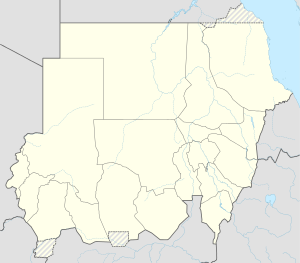Battle of Aba
| date | August 12, 1881 |
|---|---|
| place | Aba Island |
| output | Victory of the Mahdists |
| Parties to the conflict | |
|---|---|
|
Ansar (Mahdists) |
|
| Commander | |
|
Abu Saud Bey |
|
| Troop strength | |
| approx. 200 men 1 cannon |
about 300 men |
| losses | |
|
approx. 120 dead |
12 dead |
Aba - Jebel Gedir I - Sennar I - Jebel Gedir II - al-Ubayyid I - al-Ubayyid II - Sennar II - Sinkat - Sheikan - First Battle of El Teb - Second Battle of El Teb - Tamanieh - Khartoum - Abu Klea - Gallabat - Toski - Firket - Atbara - Omdurman - Umm Diwaykarat
The Battle of Aba on August 12, 1881 was the first battle of the Mahdi uprising . In an attempt to arrest the self-proclaimed Mahdi, Muhammad Ahmad , on the island of Aba , the Egyptian troops were driven out by his followers ( Ansar ).
background
On June 29, 1881, the faki Muhammad Ahmad sent letters to Sudanese sheikhs declaring himself a Mahdi and calling for a fight against the Ottoman-Egyptian administration . The Egyptian governor general ( hikimdar ) of Sudan , Rauf Pascha , was informed of the agitation by a sheikh loyal to the government, but saw this only as an expression of local religious displeasure and therefore sent two religious scholars ( alim ) to Aba (an island in the White Nile north of Kusti and Rabak ), the whereabouts of Muhammad Ahmad. After the scholars confirmed Muhammad Ahmad's intention, on August 6th Rauf Pasha dispatched his civil adjutant ( muawin ) Abu Saud Bey to persuade Muhammad Ahmad to come to him in the provincial capital of Khartoum to explain himself. Muhammad Ahmad refused, which is why Rauf Pasha sent his adjutant again after his return, this time accompanied by two companies of soldiers (200 men) and with the order to arrest Muhammad Ahmad.
course
The expedition reached the island in the early morning of August 12th. A dispute arose between Abu Saud Bey and the military commander Ali Effendi about how to proceed: Abu Saud Bey wanted to wait for the next morning to give Muhammad Ahmad the opportunity to come voluntarily. Ali Effendi ignored Abu Saud Bey's proposal and prepared to carry out the arrest with the soldiers immediately. Muhammad Ahmad had been warned, however, and had mobilized the surrounding tribes of the Dighaym , Husunat and Fallata as well as his followers in Aba, who hid in the thick bushes outside the village. Ali Effendi broke into Muhammad Ahmad's hut and shot a man there who he believed was Muhammad Ahmad. Then Muhammad Ahmad and his followers, who were only armed with stones, throwing sticks and clubs , left their hiding place and attacked the completely surprised Egyptian soldiers. The panicked Egyptians fled to the steamboat that had transported them to the island. From there the Egyptians tried to bombard the Ansar, but withdrew their ship on the morning of the following day.
consequences
Muhammad Ahmad was able to use the victory for propaganda purposes to reinforce his claim as a Mahdi and to win new followers. So he drew parallels to the Battle of Badr , the first battle of the Prophet Mohammed : not only did he and Mohammed have roughly the same number of comrades-in-arms, but both battles also fell on the 17th of Ramadan . He declared certain events and circumstances during the battle to be miraculous: For example, he had been warned by the prophet about the attempted arrest. He equated the flight from Aba with the hijra .
Another attempt to arrest Aba also failed. This time Rauf Pascha sent the provincial governor ( mudir ) of Kordofan Muhammad Said Pascha. However, when the expedition arrived, Muhammad Ahmad and his followers had already fled to the Nuba Mountains , where they set up a new camp at the foot of the Jebel Gedir (a mountain). Attempts to place Muhammad Ahmad there failed: the Egyptians were defeated there on December 9, 1881 and June 7, 1882 in the First and Second Battles of Jebel Gedir, respectively. Then Muhammad Ahmad began the conquest of Kordofan. When the extent of the Mahdi uprising became apparent to the Egyptian government at the beginning of 1882, Rauf Pasha was accused of mild and hesitant action and for this reason he was deposed as Governor General of Sudan.
literature
- Michael Asher : Khartoum. The Ultimate Imperial Adventure. Penguin Books, London et al. 2006, ISBN 978-0-14-025855-4 .
